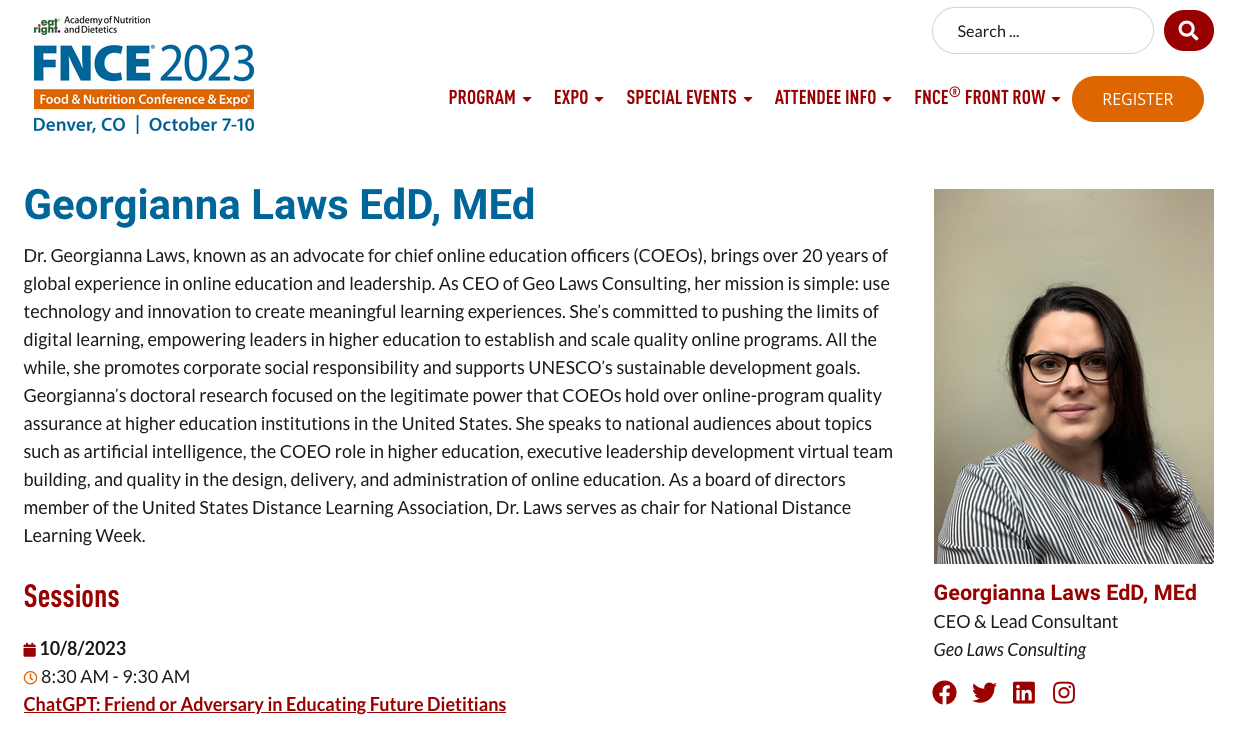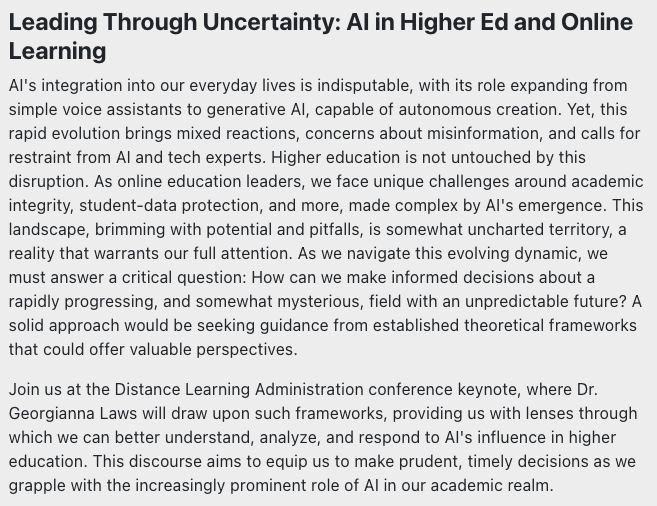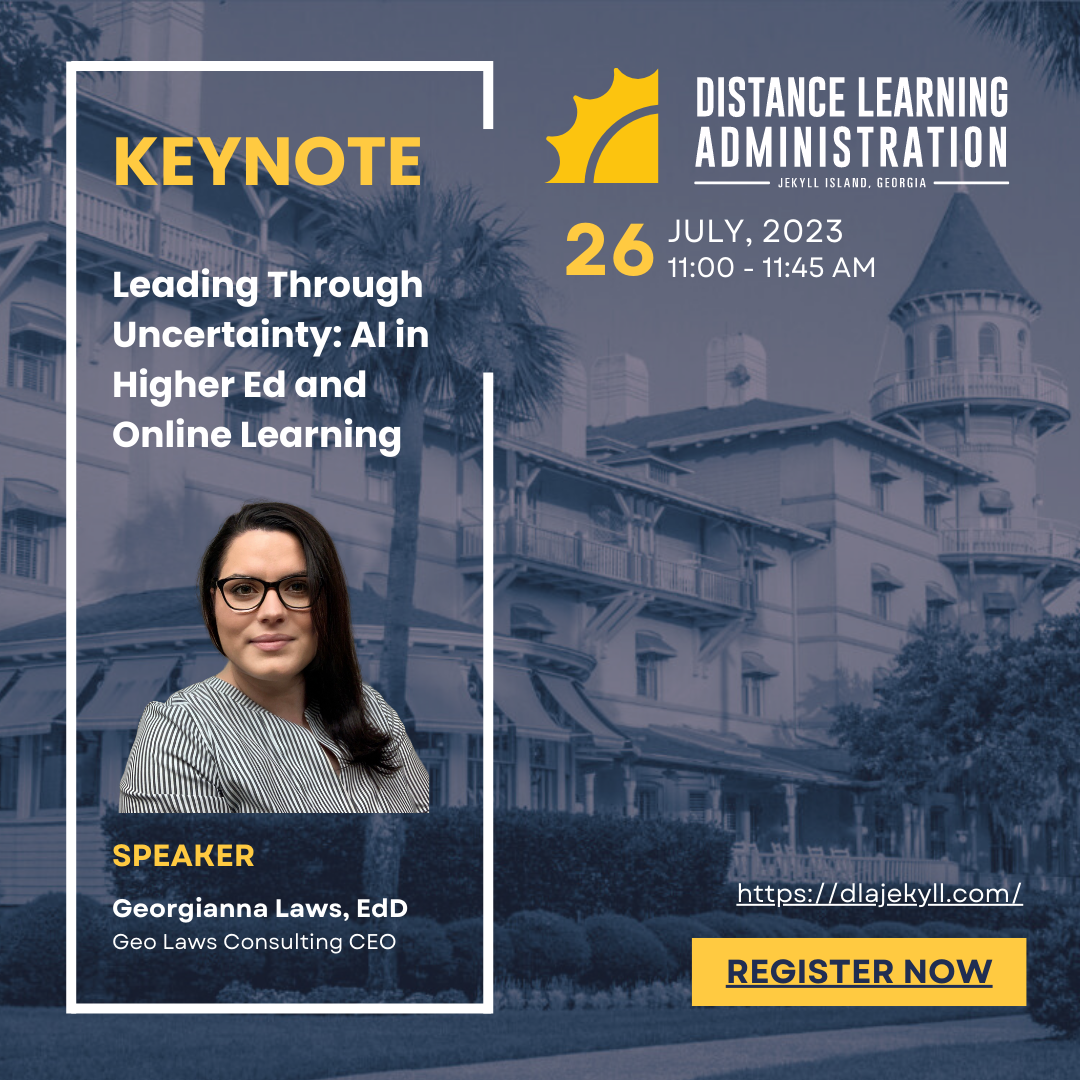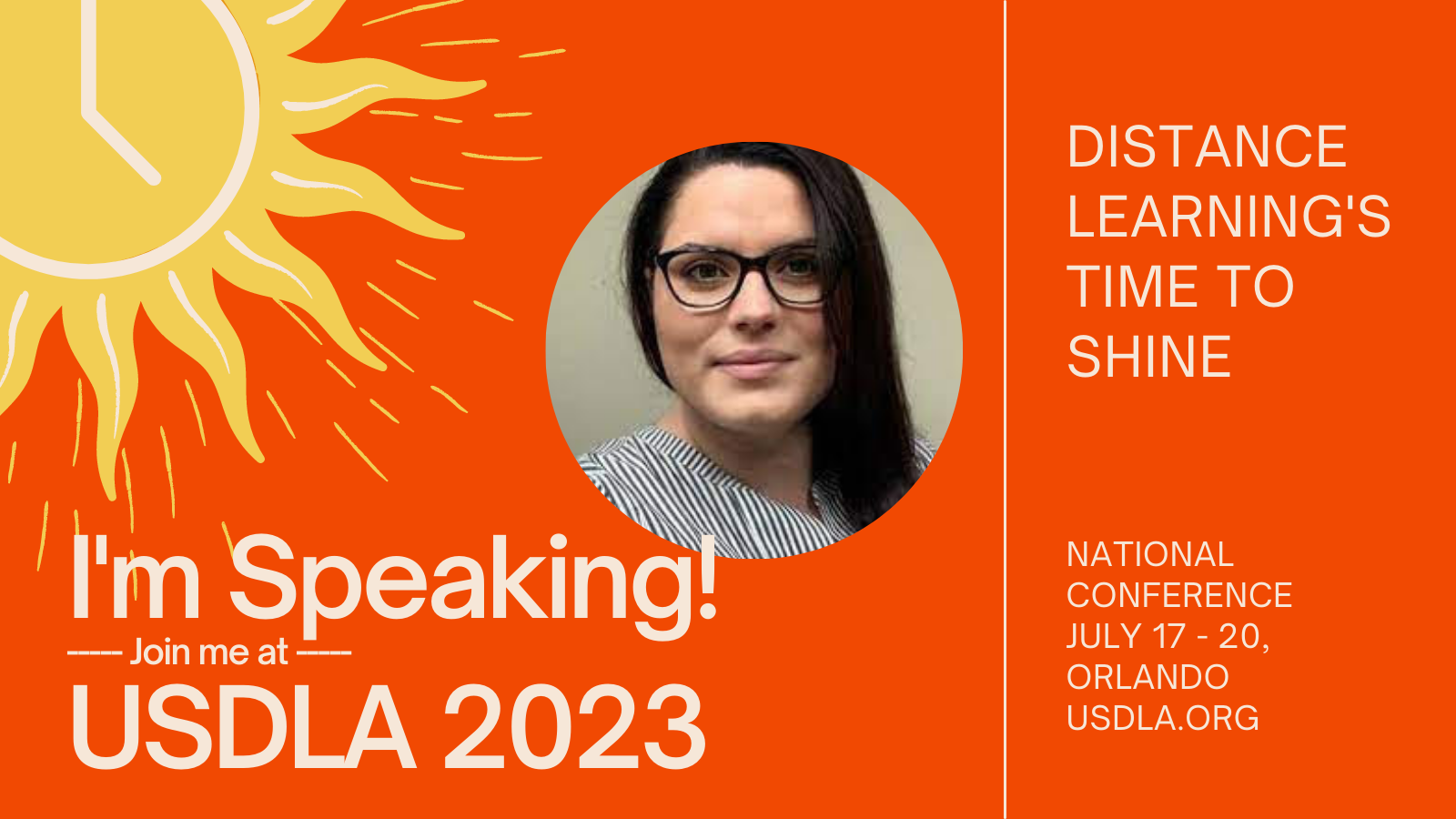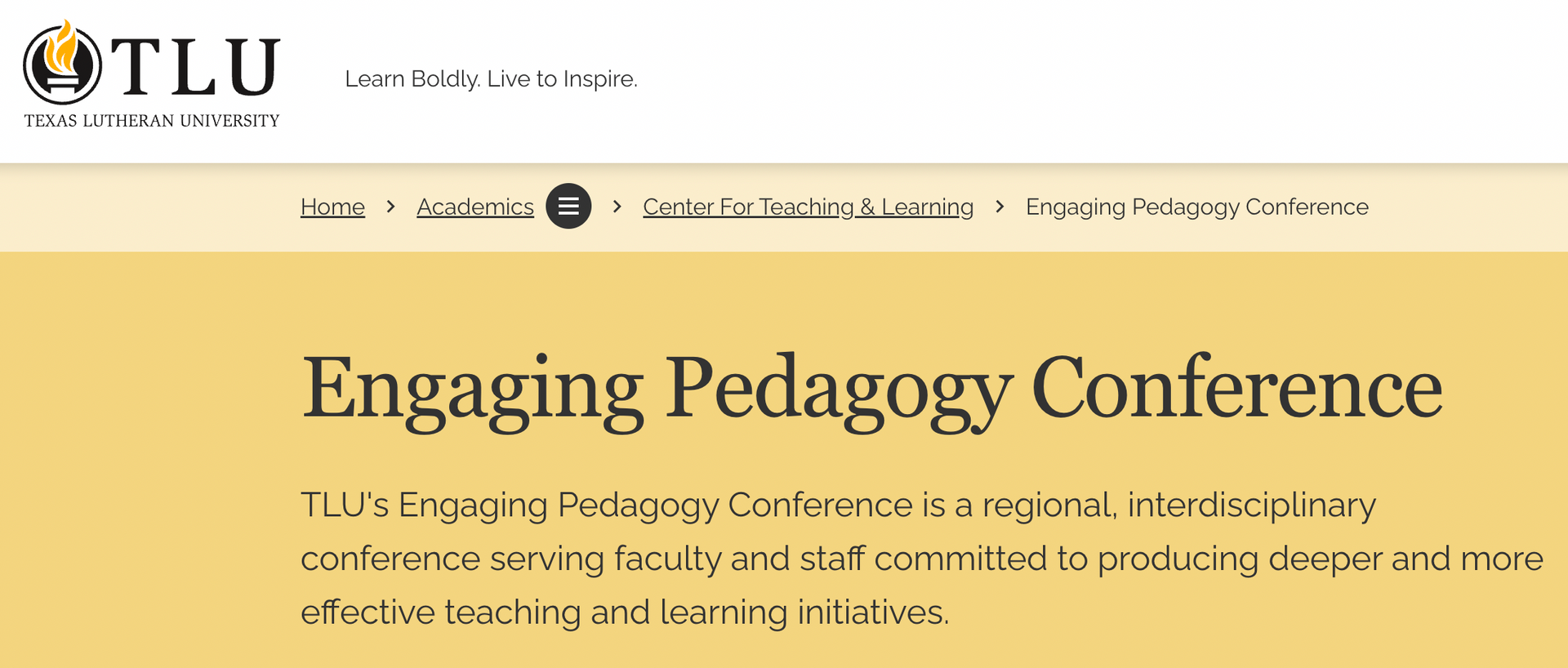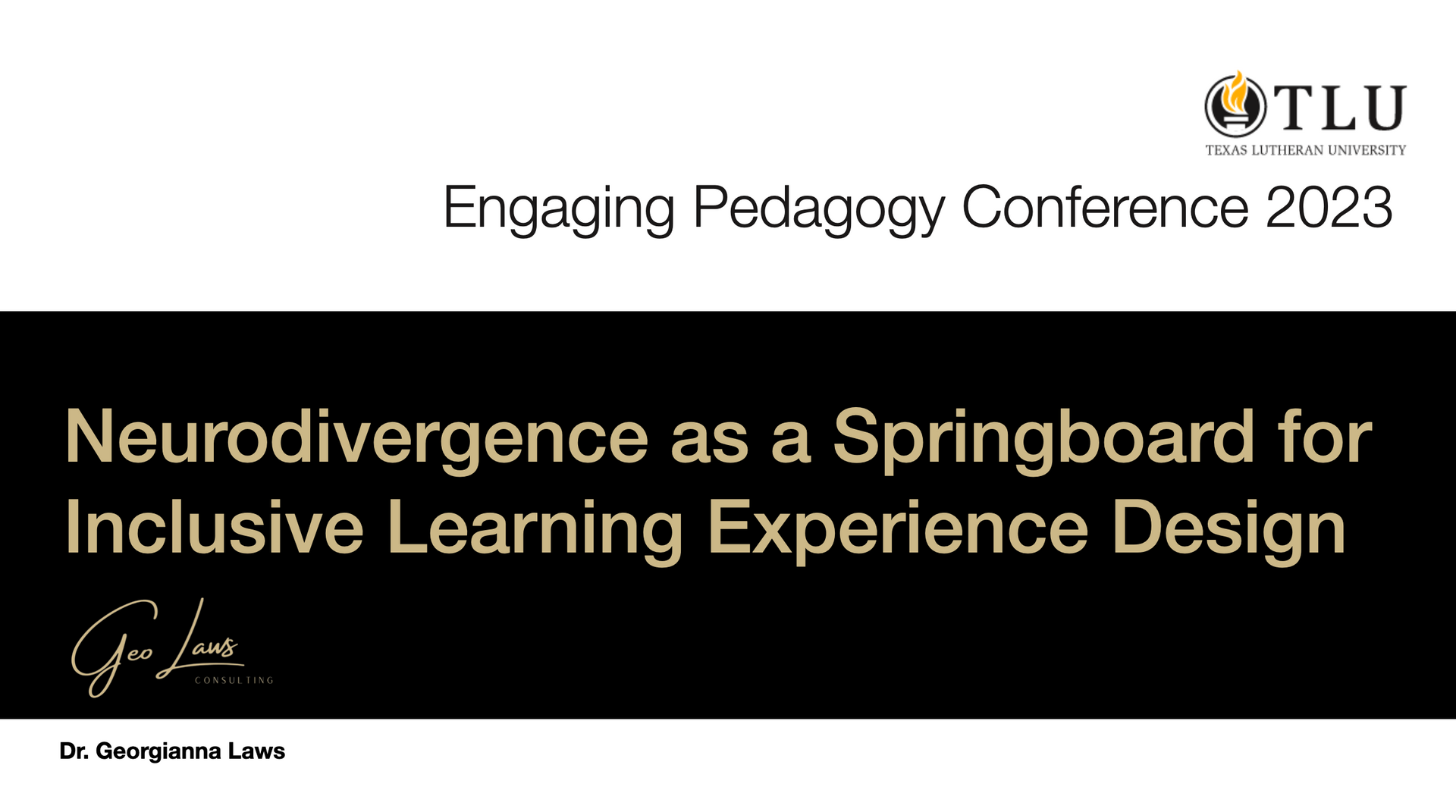News
Speaking at the Academy of Nutrition and Dietetics on October 8, 2023
Dr. Janet Reid Hector and I are collaborating to offer a presentation and demo to the nutrition and dietetics professional community, exploring the role generative AI plays in teaching, learning, assessment, research, and practice. We will tap into the latest literature to describe the changing landscape of higher ed in light of AI, and making a case for why generative AI needs to be on the radar of educators.
Do you have a need for a speaker on A.I.? Or perhaps a consultant who can guide you in implementing A.I. into your strategy and operations? If so, please schedule a free consultation to get started right away!
Keynote at the Distance Learning Administration conference on July 26, 2023
I had the absolute honor and joy of being invited to be this year's keynote speaker at the Distance Learning Administration (DLA) conference.
The DLA symposiums are designed for those involved or interested in the administration, management, planning, and evaluation of distance learning programs. The Distance Learning Administration Conference is sponsored by the Online Journal of Distance Learning Administration, USG eCampus and The University of West Georgia.
To me, the DLA is also my professional home of 15 years. This is where I gave my first presentation and many of the presentations in between for the late 15 years. This is the stage from which I heard Dr. Darcy Hardy, Michael F. Beaudoin, Dr. Myk Garn, Dr. Anthony Pina, Dr. Thomas Tobin, Dr. Barbara Truman, Dr. Deb Adair, Dr. Richard Garret, Dr. Kelvin Thompson--to name just a few legends in distance learning who have been teaching my generation how to become leaders in thought, practice, and scholarship. I am deeply thankful for the invitation and will be giving a keybote titled "Chief online education officers’ unique opportunity to lead the artificial intelligence revolution’s unfolding in higher education".
In a nutshell, Artificial intelligence (AI) has already permeated our daily lives through features like GPS, email spam filters, phone facial recognition, and the sometimes nonsensical and comical responses from voice assistants like Siri, Alexa, and Google. While these advancements were initially met with some skepticism, they are now widely used and accepted. On the other hand, the introduction of (meaning AI capable of autonomously creating complex audio, code, images, and text outputs) has stirred up mixed reactions. Forbes reports that 75% of consumers are worried about AI’s potential to spread misinformation while the very same source notes AI is a highly lucrative business, with a market size estimated to reach a staggering $407B size by the end of 2027. Mirroring the polarizing responses we see in higher ed, the responses of various national and international socio-politico-economic and governmental bodies (including the European Union, NATO, and UNESCO) range from providing AI guidance and policy to outright banning AI.
Because of its unprecedentedly fast adoption rate (ChatGPT reached $1M users just 5 days after its release), its potential for misinformation, and the slow rate at which we put out regulation, AI experts and public tech figures like Elon Musk and Steve Wozniak warn us of the serious risks AI pose to humanity and call for a much needed (but unfortunately highly unlikely) pause on AI development and training.
These anxieties are evident in various sectors. In our own higher-education “backyard”, AI exacerbated our concerns from the not-so-distant COVID-19 days over academic integrity and student-data protection in a digital world – so much so that we’ll likely need to re-envision Intellectual Property laws and the Family Educational Rights and Privacy Act, among others. In the world of medicine, the Journal of the American Medical Association notes ChatGPT scored higher than actual doctors on both quality and empathy. In the world of law, the American Board Association notes that ChatGPT-4 passed all sections of the bar exam with a score close to the 90th percentile. In the world of professional writing, the Writers' Guild of America is on an all-out strike over job loss concerns due to generative AI.
So, what should our stance be as leaders in distance learning administration? Should we embrace AI for its potential benefits and to prepare our students for the realities of tomorrow's workplace? Or steer clear of AI because its potential harm? Or, perhaps, should we take a balanced approach, carefully testing its fair use while establishing ethical and safe AI applications? But high-quality testing and regulation take deep understanding and we don’t have the luxury of time for that. So then, how we navigate this unprecedented territory? We invite you to this year's Distance Learning Administration conference keynote, where I'll share insights from the perspective of various theoretical frameworks, offering valid lenses through which we can observe AI and make our own informed decisions in a timely manner.
Do you have a need for a speaker on A.I.? Or perhaps a consultant who can guide you in implementing A.I. into your strategy and operations? If so, please schedule a free consultation to get started right away!
Speaking at the USDLA National Conference on July 17, 2023
This year, we are hosting the United States Distance Learning Association (USDLA) national conference in Orlando, FL. I am excited to offer a pre-conference session I designed as a transformation accelerator in online instructional design. In other words, in the space of 2.5 hours, I will take participants "from 0 to 100 miles an hour", so to speak, helping them create their own efficient and high quality online training. To join this session, all you have to do is register for the conference. You might expect the cost of attending the flagship conference of the oldest organization in the distance-learning space to cost thousands of dollars; it's actually quite affordable and allows you to attend in person, online, or both, based on your preference. There is no additional charge for my pre-conference session, thanks to the generosity of the USDLA!
Back to the transformation accelerator, I'll be guiding participants as they transform a training idea into a quality online course in 2 and a half hours. All that's needed is for participants to bring their own online-connected computing device of choice. This learning experience will introduce and give participants practice with concepts of systematic instructional design, through a series of hands-on exercises. The exercises will include:
- an assessment of the audience for which the training is intended;
- the robust design and alignment of the course inputs and outputs;
- development of presentation, practice, and production;
- assembly of all these parts;
- followed by a showcase and peer evaluation.
For those who want to go the extra mile, there are bonus exercises for building a course orientation and syllabus.
Do you have a need for a transformation accelerator in online instructional design, customized to your needs? Or a train-the-trainer preparing your organization's L&D team in conducting transformation accelerators? Or perhaps a speaking engagement about these topics? If so, please schedule a free consultation to get started right away!
Speaking at the TLU Engaging Pedagogy Conference on May 17, 2023
I was kindly invited to speak at the Texas Lutheran University Engaging Pedagogy Conference., where I waas an honor and a pleasure to address participants from over 20 regional schools through a talk titled "Neurodivergence as a Springboard for Inclusive Learning Experience Design". The gist of the talk is that neurodivergent learners face many challenges in higher education, particularly in the attrition-prone online environment. More details below.
"Everyone is a genius, but if you judge a fish by its ability to climb a tree, it will live its whole life believing that it is stupid."-- This quote, often attributed to Einstein, is a great centering thought for any educator. Could we inadvertently be excluding some learners based on how we design educational experiences, particularly when it comes to online learners, who are at much higher risk of attrition than onsite students (Shaikh & Asif, 2022)? In this session, we tackled this topic from the lens of neurodivergence, with a focus on online experience design as a springboard for promoting diversity, equity, and inclusion. Participants were invited to engage in group discussion and received a handout including strategies to try and share with colleagues.
Shaikh, U.U. & Asif, Z. (2022). Persistence and dropout in higher online education: Review and categorization of factors. Frontiers in Psychology, 13. Retrieved from https://doi.org/10.3389/fpsyg.2022.902070
Do you have a need for neurodiversity training or for a speaking engagement on this topic? If so, please schedule a free consultation to get started right away!



